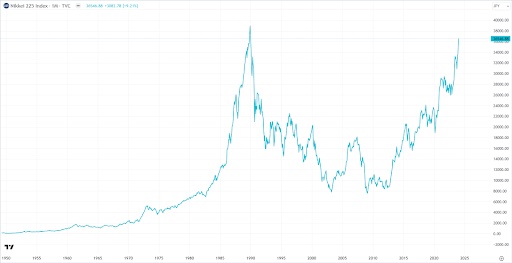
Quantum AI and the Evolution of Stock Market Analysis in the UK
Quantum AI (Artificial Intelligence) is transforming the way stock market analysis is conducted in the UK. As advancements in technology continue to push boundaries, financial institutions are exploring new approaches to gain a competitive edge. Understanding the implications of Quantum AI and its potential applications in market analysis is crucial for investors and analysts alike.
Understanding Quantum AI
Before delving into the specifics of Quantum AI, it is essential to grasp the basics of quantum computing. Unlike classical computing, which relies on binary digits or bits, quantum computing utilizes quantum bits or qubits. Qubits have the ability to exist in multiple states simultaneously, allowing for parallel processing and more complex computations.
Quantum AI is a hybrid field that merges the power of quantum computing with AI techniques. This combination enables the development of algorithms capable of analyzing vast amounts of financial data quickly and accurately.
The Basics of Quantum Computing
Quantum computers leverage quantum phenomena such as superposition and entanglement to perform calculations at an unprecedented speed. By harnessing these properties, quantum computers can solve complex problems that are intractable for classical computers.
Superposition allows qubits to exist in multiple states simultaneously, enabling massive parallelism. This means that a quantum computer can explore and analyze different possibilities simultaneously, significantly speeding up computations. For example, a classical computer would need to perform calculations sequentially, one after another, while a quantum computer can explore all possibilities at once.
Entanglement, on the other hand, enables the connection of qubits in such a way that the state of one qubit is correlated with the state of another, regardless of the physical distance between them. This property allows for the creation of quantum algorithms that can exploit this correlation to solve problems more efficiently. It’s like having a network of interconnected qubits that can communicate and share information instantaneously, even if they are located far apart.
Quantum AI: A New Frontier
Quantum AI represents a new frontier in the field of market analysis. Traditional forms of analysis rely on historical data and mathematical models to predict market trends. However, in today’s fast-paced and ever-changing financial landscape, these traditional approaches may fall short.
Quantum AI introduces a paradigm shift by leveraging the power of quantum computing to analyze vast amounts of data in real-time. This allows for the identification of patterns and trends that may have otherwise gone unnoticed with conventional methods. The ability to process and analyze complex data sets quickly provides a distinct advantage for investors and analysts.
Imagine a scenario where a quantum AI system can analyze millions of financial transactions happening around the world simultaneously. It can identify subtle correlations and patterns that human analysts might miss. This real-time analysis can help investors make informed decisions and react swiftly to market changes.
Moreover, quantum AI has the potential to revolutionize other fields beyond finance. For example, in drug discovery, quantum AI algorithms can analyze vast databases of chemical compounds and predict their effectiveness in treating specific diseases. This can significantly accelerate the drug development process and lead to the discovery of new treatments.
However, it’s important to note that quantum AI is still in its early stages of development. The technology is complex and requires specialized hardware and expertise. Researchers and scientists are continuously working to overcome the challenges and limitations of quantum computing to unlock its full potential in the field of AI.
The Traditional Approach to Stock Market Analysis
Before the advent of Quantum AI, market analysis predominantly relied on the meticulous examination of historical data and the application of mathematical models. Analysts would meticulously evaluate past performance, industry trends, and other relevant factors to make investment decisions.
The Role of Data in Market Analysis
One crucial aspect of traditional market analysis is the role of data. Historical data, such as stock prices, trading volumes, and market indices, serve as the foundation for identifying patterns and making informed predictions. Access to accurate and comprehensive data is essential for accurate analysis.
Limitations of Traditional Analysis Methods
However, traditional analysis methods have their limitations. The volume and complexity of data available today present challenges for traditional approaches, as they often struggle to process and analyze vast amounts of information accurately and in real-time.
Additionally, traditional methods may not effectively capture dynamic market conditions and rapidly changing investor sentiments. As markets evolve, relying solely on historical data and models may not provide the agility required to stay ahead.
Quantum AI in Stock Market Analysis
Quantum AI offers a transformative solution to the limitations of traditional analysis methods. By harnessing the power of quantum computing, it revolutionizes the way data is processed and analyzed in the financial industry.
How Quantum AI is Changing the Game
The integration of quantum computing and AI techniques allows for the development of more sophisticated algorithms capable of processing and analyzing vast amounts of financial data more efficiently. Quantum AI algorithms can identify subtle patterns and correlations that traditional methods may miss, providing investors with a deeper understanding of market dynamics.
This deeper level of analysis can lead to more accurate predictions, allowing investors to make better-informed decisions. Quantum AI algorithms can adapt and learn from new data in real-time, enabling them to handle evolving market conditions with greater agility.
The Benefits of Quantum AI in Market Analysis
The benefits of Quantum AI in market analysis are vast. The ability to process and analyze vast amounts of data quickly and accurately can provide investors and analysts with a competitive advantage. Quantum AI can assist in identifying market trends, predicting price movements, and uncovering hidden opportunities that may not be apparent with traditional analysis methods.
Furthermore, Quantum AI can help mitigate risks by identifying potential threats and facilitating risk management strategies. The integration of Quantum AI into market analysis has the potential to enhance investment decision-making and optimize portfolio performance.
The Impact of Quantum AI on the UK Stock Market
The adoption of Quantum AI in the UK financial sector has the potential to reshape the way stock market analysis is conducted. Already, financial institutions are exploring ways to incorporate Quantum AI into their investment strategies and decision-making processes.
Quantum AI and the UK’s Financial Sector
The UK’s financial sector is renowned for its innovation and adaptability. The integration of Quantum AI presents a significant opportunity for UK institutions to gain a competitive edge in the global market. By embracing this technology, they can stay ahead of the curve and leverage its potential for improved performance and risk management.
Future Predictions for Quantum AI in the UK
The future of Quantum AI in the UK’s stock market analysis looks promising. As the field continues to advance, we can expect to see more sophisticated algorithms and models that better capture market dynamics. With increased adoption and refinement, Quantum AI has the potential to become a mainstream tool in the arsenal of every investor and analyst.
Ethical Considerations of Quantum AI in Stock Market Analysis
While Quantum AI offers significant benefits, it is essential to address the ethical considerations surrounding its implementation in stock market analysis.
Data Privacy and Security Concerns
The use of Quantum AI in market analysis involves the collection and utilization of vast amounts of sensitive financial data. As such, it is paramount to ensure robust data privacy and security measures are in place to safeguard this information. Strict regulations and protocols must govern the collection, storage, and use of data to protect the interests of investors and uphold ethical standards.
The Question of Fairness in AI-driven Analysis
Another ethical consideration is the question of fairness in AI-driven analysis. Machine learning algorithms used in Quantum AI can inadvertently introduce biases, potentially leading to unfair treatment of certain market participants or sectors. Ensuring transparency, accountability, and ethics in algorithm development and deployment is essential to mitigate any unintended consequences.
Conclusion
In conclusion, Quantum AI is revolutionizing stock market analysis in the UK. By harnessing the power of quantum computing, market analysis can be conducted more efficiently, accurately, and in real-time. The integration of Quantum AI offers numerous benefits, including enhanced predictions, improved risk management, and the identification of hidden opportunities. However, ethical considerations surrounding data privacy and fairness must be addressed to ensure the responsible use of this technology. As Quantum AI continues to evolve, it has the potential to shape the future of stock market analysis in the UK and beyond.







